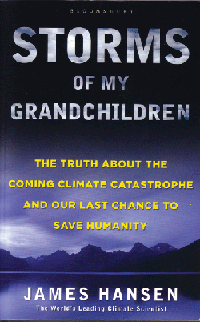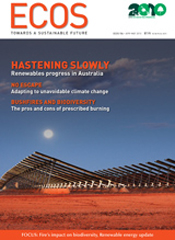
|
Published:
A leading climate scientist writes for the people
NASA scientist James Hansen’s testimony on climate change to US congressional committees in the late 1980s was instrumental in raising awareness of global warming. In his latest book, Hansen explains the science of global climate change in non-technical language and makes a strong case for the urgent reduction of atmospheric concentration of CO2 to 350 parts per million (maximum).

|
| James Hansen |
Storms of My Grandchildren is informative, clear, frank and up-to-date – the afterword was written in late 2009. Hansen argues from the science, and in the few places where he speculates on scientific questions, he explains the bases for his hypotheses.
Hansen describes the three independent sets of evidence for his conclusion that climate change is a very serious, urgent, human-induced crisis: evidence of palaeoclimate (prehistoric climate) changes; empirical observations of current and recent climate changes; and climate models. One of the key observations from palaeoclimate data is that sea-level rises to heights at least several metres above today’s level occurred in interglacial periods that were only 1 to 2°C warmer than today. Furthermore, rates of sea-level rises of a few metres per century were not uncommon in the palaeoclimate record. ‘Instead’, he writes, ‘it is the stability of the sea-level for the past 7000 years that is unusual.’
Interspersed with the science is the story of Hansen’s struggle to communicate his knowledge and concern to the public. He faced censorship and obstruction by the former George W. Bush administration, and timidity on the part of the mainstream media. He also struggled with the scientific profession’s unwritten rule that scientists should stick to the science they know and leave wider communication of the results and their policy implications to others, such as politicians and journalists. Gradually he overcame his inhibitions and became a trenchant critic of government failure to take genuine climate action.
He argues convincingly from the science that in a world where future supplies of oil and gas are limited, the key strategy is to phase out emissions from coal-fired power stations and oil substitutes (tar sands, shale oil, oil from coal) by 2030. Otherwise, he argues, huge changes in Earth’s climate are inevitable, and they will probably occur in the 21st century, and will be irreversible on timescales of many thousands of years.
However, in his brief discussion of the technologies needed to substitute for dirty coal, Hansen is out of his depth. He acknowledges that he is not an expert in energy and that he relies on the advice of ‘energy experts’. His attempts to justify his pro-nuclear stance are unconvincing, repeating claims that renewable energy is ‘intermittent’ and cannot provide ‘baseload power’ and resorting to phrases such as ‘most energy experts agree that’. His sources are ‘utility executives and their technical staff’ and his acknowledgments for the book include two outspoken promoters of the integral fast reactor, a technology that is still at the R&D stage. Neither of these two proponents has published any scholarly work on energy. I think he has been poorly advised. The fallacies repeated by Hansen have been refuted in several major US and European reports and in my books Greenhouse Solutions with Sustainable Energy and Climate Action: A Campaign Manual for Greenhouse Solutions.
Despite its shortcomings with regard to energy technologies, I highly recommend Hansen’s book for its explanations of climate science and in particular why the latest IPCC report is too timid in its projections of climate change.

|
|
Storms of My Grandchildren The Truth About the Coming Climate Catastrophe and Our Last Chance to Save Humanity James Hansen Bloomsbury 2009, Hardcover ISBN: 9781608192007 – AU$35.00 |
Dr Mark Diesendorf is Deputy Director of the Institute of Environmental Studies at the University of New South Wales. He has published several greenhouse/energy scenarios for Australia.



